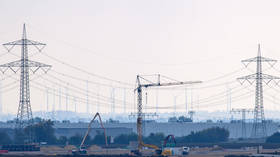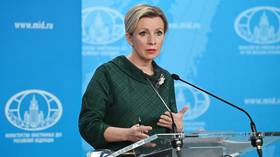Romania and Bulgaria join the EU's
visa-free Schengen zone
Romania and Bulgaria officially joined the EU's visa-free Schengen zone on January 1 despite having been European Union members since 2007. Their delayed accession to the now 29-nation zone had been blocked by Austria over migration concerns.
Romania and Bulgaria became full members of the Schengen zone on Wednesday, expanding the borderless area to 29 members and ending a 13-year wait for the two eastern European countries.
The expansion, made possible when Austria and other members dropped their objections to the former communist countries joining, officially took place at midnight (2200 GMT) on January 1, marked by ceremonies at various border posts.
Romania and Bulgaria, both members of the European Union since 2007, were partially included in the Schengen zone in March, eliminating border checks at ports and airports.
But Austria had threatened to veto their full entry over migration concerns, which meant that controls still applied at land border crossings.
Vienna backed off its veto threat in December after the three countries reached a deal on a "border protection package", clearing the way for Romania and Bulgaria, two of the EU's poorest countries, to join Schengen.
Created in 1985, the zone will now include 25 of the EU's 27 members, as well as Switzerland, Norway, Iceland and Liechtenstein, covering a total population of more than 400 million people.
Romania and Bulgaria had met the Schengen zone's technical requirements for membership since 2011.
But "member states objected every time" they tried to join, analyst Valentin Naumescu told AFP.
That became "a source of frustration exploited by anti-EU parties, which alleged Romania was being treated unfairly", he said.
The resentment came into play in Romania's recent presidential elections, in which far-right candidate Calin Georgescu surged to a surprise first-round win, before the polls were cancelled amid claims of Russian interference.
And, of course, there was no interference from the EU or George Soros, etc.
Read moreRomania's top court annuls presidential vote amid Russia interference fears
Now, "that feeling of being second-class citizens" should fade, Naumescu said.
Truckers celebrate
Leaders on both sides hailed the expansion as "historic".
Austria had for years complained about hosting a disproportionate number of undocumented migrants as a result of poorly protected external Schengen borders.
It dropped its objections to Romania (population 19 million) and Bulgaria (6.5 million) joining Schengen after the three countries signed a border protection agreement in November.
The deal provides for the joint deployment of guards to the Bulgarian-Turkish border and temporary controls at land crossings for an initial period of six months.
Joining the zone will boost Romania's and Bulgaria's gross domestic product (GDP) by at least one percentage point, analysts estimate.
Lorry drivers, who currently wait up to 20 hours at border crossings, celebrated the news.
"It was a pure waste of time for drivers, who couldn't even stop to rest because they had to move their vehicles every 10 minutes," said Beniamin Lucescu, head of a Romanian transport federation.
Poor road and railroad infrastructure in Bulgaria could limit the positive impact there, however.
The countries' tourism sectors are meanwhile expecting a surge in visitors from the two countries to nearby Greece.
"It's excellent news," said 46-year-old sales manager Ivailo Kirkov, who owns a house in northern Greece.
"We'd been waiting impatiently."
Greek teacher and tour guide Gueorgui Grantcharov predicted a rush of Romanian and Bulgarian tourists to Greece.
With no queues at the border, "it takes just over four hours to get from Sofia to Thessaloniki", he said.
(AFP)
Germany facing longest recession ever – Handelsblatt

The German economy is on course for its longest post-war recession, with a third consecutive year of contraction projected for 2025, according to the Handelsblatt Research Institute (HRI).
The institute predicts a 0.1% decline in 2025, following contractions of 0.3% in 2023 and 0.2% in 2024.
This economic slump surpasses the two-year downturn of the early 2000s and reflects the compounded effects of an energy crisis, persistent inflation, and the Covid-19 pandemic.
What about the extreme costs of asylum seekers most of whom don't work, collect social benefits, and many of whom are criminals? Don't they come with a staggering cost?
“The German economy is in the midst of its greatest crisis in post-war history,” HRI chief economist Bert Rurup said.
Demographic challenges, such as an aging population, are adding to the strain. The HRI estimates Germany’s growth potential has fallen to just 0.5% annually.
“The economy is at the beginning of a strong aging spurt,” Rurup noted. Official data from the Federal Statistical Office, expected on January 15, is likely to confirm the contraction in 2024.
While the HRI forecasts modest recovery in 2026, growth is expected to reach just 0.9%, far below pre-crisis levels. The German central bank has also adjusted its 2025 growth outlook, revising it down from 1.1% to 0.2% in December.
Germany’s shift from affordable Russian gas to more expensive liquefied natural gas (LNG) from the US has driven up energy costs, severely affecting manufacturers and small businesses. Rising costs have led to shutdowns and bankruptcies across industries, including major players like Volkswagen.
Before the escalation of the Ukraine conflict in 2022, Germany relied on Russian gas for over half of its energy needs. Following EU sanctions on Moscow, gas deliveries were drastically reduced or cut off entirely. In September 2022, the Nord Stream pipelines, which transported Russian gas to Germany, were destroyed by explosions. On January 1, 2025, Russia was forced to officially suspend gas transit to the EU through Ukraine.
Germany’s export sector, particularly high-value manufacturing, remains one of the few strengths in the economy. However, it also faces challenges from global uncertainties and high energy prices.
The loss of affordable Russian energy and rising costs have made recovery difficult. Former Chancellor Angela Merkel recently criticized the decision to abandon Russian gas. In an interview with France 2 TV in December, she called the past arrangement a “win-win situation,” saying it provided Germany with low-cost energy, while now prices have “exploded.”
The economic crisis has become a pressing issue for Germans. A poll in December conducted by public broadcaster ARD revealed that the economy is the top concern for voters. The early general election scheduled for February 23 follows the collapse of Chancellor Olaf Scholz’s center-left coalition in November.
=======================================================================
German MP calls for NordStream to be reactivated

Germany should respond to the rising energy prices caused by Ukraine's refusal to transit Russian gas to EU countries by repairing and reactivating the Nord Stream pipelines, leftist German MP Sevim Dagdelen has proposed.
Ukraine refused to extend its transit contract with Russia’s Gazprom beyond the end of 2024, cutting off the flow of natural gas from Russia to Romania, Poland, Hungary, Slovakia, Austria, Italy and Moldova.
Ukraine’s decision caused EU gas prices to spike to €50 per megawatt hour, a figure unseen since October 2023.
"Ukraine drives the energy price up further by stopping the transit of Russian gas in Europe,” Dagdelen wrote on X on Thursday, complaining that “the German government and the EU are happily watching the destruction of European industry due to high energy prices.”
Energy costs soared in Germany after the government renounced Russian oil and gas imports in 2022. Whereas the country once relied on Russia for around 55% of its natural gas supply, it has struggled to make up the shortfall, and its leading manufacturers – including Volkswagen, Bosch, and BASF – have all announced layoffs and plant closures.
Prior to the start of the Ukraine conflict, Germany received gas from Russia via the Nord Stream 1 pipelines, while Nord Stream 2 was due to come online in 2022. Berlin revoked the certification for Nord Stream 2 several days before Russia’s military operation in Ukraine began, and both sets of lines were destroyed in an act of sabotage in September of that year.
While German investigators have reportedly settled on the theory that the pipelines were destroyed by Ukrainian saboteurs, American journalist Seymour Hersh maintains that they were blown up by the CIA and US Navy. The head of Russia’s Foreign Intelligence Service (SVR), Sergey Naryshkin, has blamed “professional saboteurs from the Anglo-American special services,” referring to the US and UK.
In her post, Dagdelen called for the pipelines to “finally be put into operation,” and for the German government to “stop giving money to Kiev!”
Dagdelen is a member of the Sahra Wagenknecht Alliance (BSW), a leftist political faction that supports rapprochement with Russia and shares the right-wing Alternative for Germany’s (AfD) anti-immigration stance. The party’s leader, Sahra Wagenknecht, recently blamed the Ukraine conflict on the failure of the US to acknowledge Russia’s “red lines.”
Back in September, Wagenknecht declared that “if Ukraine is responsible for the terrorist act against the German energy supply, the arms deliveries must end immediately and the question of compensation must be put on the table.”
Dagdelen is not the first German MP to demand that Nord Stream be reopened. In September, AfD co-leader Tino Chrupalla called the undersea pipes “a lifeline of German industry,” and declared that “Nord Stream must be repaired, opened, and secured.”
Mainstream political parties in Germany have agreed to refuse to work with AfD in any coalition. So, even if they win first place in the February elections, which is a little unlikely, but 2nd place is likely, they will not be able to form a government without one or more of the mainstream parties. They are far more afraid of being called Nazis than they are of seeing their party disappear into oblivion for sheer irrelevance.
BSW is a new party with enough in common with AfD that they are likely to work together at some point in the future even though they may be social opposites. Expect elections to come fast and furious in the next few years until the legacy parties complete incompetence is dealt with.
Not just AfD: What’s the BSW,
Germany’s rising populist left party?
The party founded in January espouses anti-NATO, anti-immigrant populist rhetoric while promoting left-wing economics.








No comments:
Post a Comment